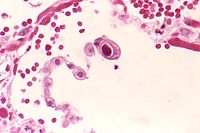
Photo from wikipedia
Simple Summary Human cytomegalovirus (HCMV) infects 40–70% of adult populations in developed countries and this is thought to be involved in breast cancer progression; however, reports of detection of the… Click to show full abstract
Simple Summary Human cytomegalovirus (HCMV) infects 40–70% of adult populations in developed countries and this is thought to be involved in breast cancer progression; however, reports of detection of the viral genome in breast tumors ranges from 0–100%. We optimized a method that is both sensitive and specific to detect HCMV DNA in tissues from Canadian breast cancer patients. Only ~42% of HCMV-seropositive patients expressed viral DNA in their breast tumors. Viral transcription was not detected in any HCMV-infected breast tumors, indicating a latent infection; however, HCMV seropositivity and the presence of latent infections in breast tumors were independently, and in combination, associated with increased metastasis. HCMV DNA-positive tumors were also associated with lower relapse-free survival. Therefore, HCMV infection status should be accounted for during the monitoring and treatment of breast cancer patients. Prevention or reducing the effects of HCMV infection could decrease morbidity and mortality from metastatic disease. Abstract Human cytomegalovirus (HCMV) infects 40–70% of adults in developed countries. Detection of HCMV DNA and/or proteins in breast tumors varies considerably, ranging from 0–100%. In this study, nested PCR to detect HCMV glycoprotein B (gB) DNA in breast tumors was shown to be sensitive and specific in contrast to the detection of DNA for immediate early genes. HCMV gB DNA was detected in 18.4% of 136 breast tumors while 62.8% of 94 breast cancer patients were seropositive for HCMV. mRNA for the HCMV immediate early gene was not detected in any sample, suggesting viral latency in breast tumors. HCMV seropositivity was positively correlated with age, body mass index and menopause. Patients who were HCMV seropositive or had HCMV DNA in their tumors were 5.61 (CI 1.77–15.67, p = 0.003) or 5.27 (CI 1.09–28.75, p = 0.039) times more likely to develop Stage IV metastatic tumors, respectively. Patients with HCMV DNA in tumors experienced reduced relapse-free survival (p = 0.042). Being both seropositive with HCMV DNA-positive tumors was associated with vascular involvement and metastasis. We conclude that determining the seropositivity for HCMV and detection of HCMV gB DNA in the breast tumors could identify breast cancer patients more likely to develop metastatic cancer and warrant special treatment.
Journal Title: Cancers
Year Published: 2022
Link to full text (if available)
Share on Social Media: Sign Up to like & get
recommendations!